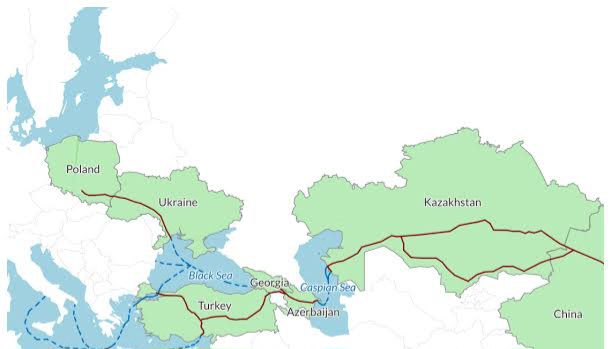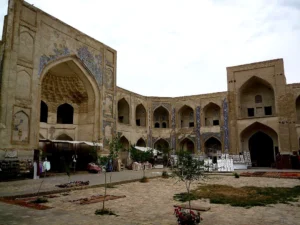Kazakhstan’s Ambitious Plans to Boost Eurasian Connectivity

Kazakhstan, a pivotal player in the Eurasian transit landscape, has unveiled ambitious initiatives aimed at bolstering regional connectivity and fostering trade along the historic Middle Corridor. With strategic foresight and substantial investments, Kazakhstan seeks to elevate its role as a vital link between Asia and Europe, facilitating smoother transit traffic and stimulating economic growth across the region.
Central to Kazakhstan’s vision is the goal of increasing the capacity of the Middle Corridor to an impressive 10 million tons by 2030. To achieve this objective, Kazakhstan has embarked on collaborative efforts with key partners, signing roadmaps with Azerbaijan, Georgia, and Turkiye to streamline logistics and address bottlenecks along the corridor by 2027.
Situated at the heart of the Eurasian continent, Kazakhstan occupies a strategic position as a conduit for Asia-Europe transit traffic. The country serves as a gateway for the shortest routes connecting Europe to Central Asia, China, and Southeast Asia, underscoring its significance in facilitating global trade.
Over the past 15 years, Kazakhstan has committed substantial resources, investing $35 billion in the transport and logistics sector. This investment has fortified Kazakhstan’s infrastructure, establishing a robust network of transit corridors and routes. With thirteen international corridors traversing the nation, including five railways and eight auto corridors, Kazakhstan stands as a linchpin for regional connectivity.
The Trans-Caspian International Transport Route (TITR), alongside other key corridors such as the Northern Corridor, Southern Corridor, Central Asian Corridor, and North-South Corridor, exemplifies Kazakhstan’s dedication to enhancing regional connectivity. These corridors serve as vital arteries for trade and transport, catalyzing economic development not only within Kazakhstan but also across interconnected regions.
In a significant milestone, Kazakhstan Temir Zholy (KTZ), Georgian Railway, and Azerbaijan Railways forged an agreement to establish a joint venture to develop multimodal services on the TITR. This collaboration led to the formation of Middle Corridor Multimodal, a new company aimed at providing seamless logistics solutions and optimizing cargo flow along the China-Europe/Turkiye-China route.
Furthermore, Kazakhstan has actively engaged European transport and logistics companies to bolster connectivity. Agreements with companies like Rhenus from Germany and LTG Cargo from Lithuania demonstrate Kazakhstan’s commitment to fostering international partnerships and diversifying cargo flows.
The European Bank for Reconstruction and Development (EBRD) has identified the Central Trans-Caspian Network (CTCN), traversing southern Kazakhstan, as a sustainable option for enhancing links between Central Asia and Europe. With plans underway to construct and upgrade extensive railway networks, including the Khorgos dry port near the Chinese border, Kazakhstan is poised to further enhance its transit facilities.
EBRD estimates highlight the substantial investment required for these projects in Central Asia, emphasizing their transformative potential. With concerted efforts and strategic investments, Kazakhstan aims to significantly increase transit container volumes along the CTCN, facilitating smoother and more efficient trade between Asia and Europe.
As Kazakhstan continues to spearhead initiatives for enhanced regional connectivity, the nation reaffirms its commitment to fostering economic integration and prosperity across Eurasia.


